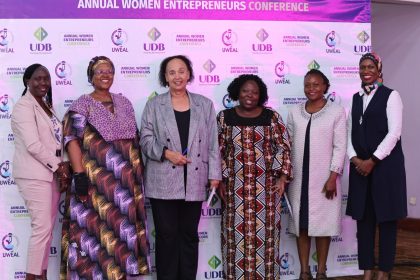Bank of Uganda adopting new technologies to regulate e-payments
 Atingi-Ego said the BoU is committed to ensuring a smooth and orderly embrace of innovations to enhance financial inclusion, strengthen our operational and
policy frameworks, and foster a resilient financial sector that supports
Uganda’s socioeconomic transformation by increasing the economy’s monetisation.
Atingi-Ego said the BoU is committed to ensuring a smooth and orderly embrace of innovations to enhance financial inclusion, strengthen our operational and
policy frameworks, and foster a resilient financial sector that supports
Uganda’s socioeconomic transformation by increasing the economy’s monetisation.
Michael Atingi-Ego, the Deputy Governor, Bank of Uganda, has said banking hours are a thing of the past as advances in financial technology (fintech), have created greater levels of convenience in the way people can access their bank accounts.
Taking into account these developments, he said BoU is adopting technologies for real-time banking regulation and supervision. He said as the regulator, they are also working with the Uganda Bankers Association (UBA) on a strategy to promote e-payments for a cash-lite economy.
“Today, bankers’ hours are a relic of the past. Fintech companies provide banking services more innovatively, efficiently, and often at lower fees. And to avoid obsolescence, traditional banks have embraced digitalisation and are promoting branchless banking. I dare say that this trend will continue as technology evolves to offer more innovative ways of providing banking and financial services more conveniently, affordably, and, hopefully, universally inclusive,” he said.
Atingi-Ego was speaking during the opening of the Annual Bankers Conference on Monday, organised by UBA and under the theme ‘The trends and innovations in the fintech space, changing the face of banking and financial services’. Mastercard is the main sponsor of the two-day event. Fintech compasses to any app, software, or technology that allows people or businesses to digitally access, manage, or gain insights into their finances or make financial transactions.
He said, “Technology-enabled innovation is transforming financial services by producing new business models, applications, processes, or products that enrich people’s access to safe and secure storage of money; easier and quicker payments; loans; effective financial management; and other financial products and services, including investment and insurance.”
The ABC is a key activity in UBA’s annual calendar that brings together regulators, practitioners and various industry experts from domestic, regional, international, and national spheres involved in delivering financial/banking services.
Atingi-Ego said fintech is improving financial inclusion. Mobile money has enabled millions of people who previously had no access to formal financial services tos end and receive money, make payments, and save.
“ The FinTech revolution is transforming the financial landscape. It is a force that demands thoughtful consideration and proactive risk management. The trends and innovations are not isolated occurrences but interconnected threads weaving the fabric of the future of financial services. While they offer immense growth opportunities, they also present challenges, including data privacy concerns, regulatory complexities, cyber risk, and AML and CFT risks. Therefore, as financial professionals, we are responsible for embracing these changes, adapting our strategy, and ensuring that these innovations are harnessed to create a more inclusive, efficient, and secure financial future for all,” he said.
He said the BoU is committed to ensuring a smooth and orderly embrace of innovations to enhance financial inclusion, strengthen our operational and policy frameworks, and foster a resilient financial sector that supports Uganda’s socioeconomic transformation by increasing the economy’s monetisation.

 Trading leads as main source of income for Ugandans
Trading leads as main source of income for Ugandans
 New leadership for bankers’ umbrella as total assets top $12 billion
New leadership for bankers’ umbrella as total assets top $12 billion
 Big fish in small pond Stanbic notches up $100m profit for 2023 topping previous figure by 15%
Big fish in small pond Stanbic notches up $100m profit for 2023 topping previous figure by 15%
 Inaugural event sets agenda for supporting women-owned businesses
Inaugural event sets agenda for supporting women-owned businesses
 Standard Bank Group reports $2 billion earnings up 27% from 2022
Standard Bank Group reports $2 billion earnings up 27% from 2022
 Stanbic Bank Uganda Chief Executive elevated to regional role in Nairobi
Stanbic Bank Uganda Chief Executive elevated to regional role in Nairobi
